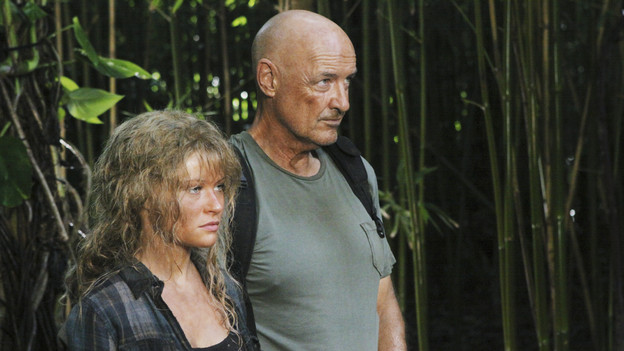With “Full Measures,” Breaking Bad wrapped up its third season confident of its place as the best drama on television all year. With one of the most focused and intense episodes, season three concluded with a bang.
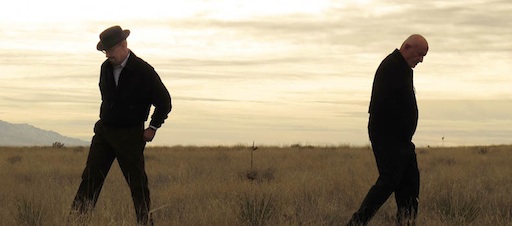
Check the temperature of your tea and enter spoiler country after the break…
Category: tv
Farewell, Craphole Island
Some brief thoughts on the series finale of Lost coming up just as soon as I re-read Cat’s Cradle
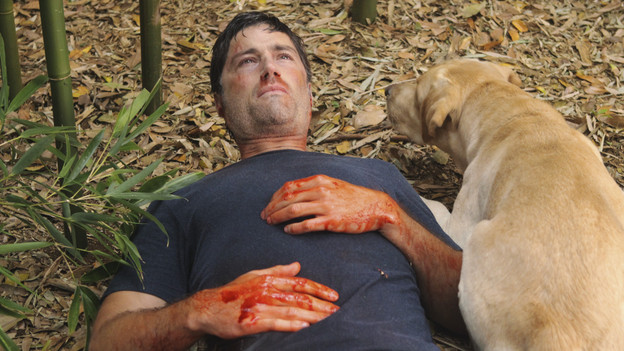
You All Everybody
Tonight’s Lost-related festivities lack the amount of “Previously on Lost” rocking out as desired (that sold out incredibly quickly), so instead it kicked off here at BRR World HQ with a relatively Island-inspired dinner. (With less wild boar than a truly Island-inspired feast might have.)
Teriyaki marinated wild salmon with mango, onion, tomato and avocado. Served with asparagus, rice and salad. OK, salmon isn’t all that Island-specific, but it paired nicely with the Dharma Initiative branded Merlot.
Watching the clip show, it’s pretty clear that Lost is particularly unique in television history. Since having the most expensive pilot in broadcast television history, Lost is one of the last shows to film on 35mm film, rather than HD digital video, and may be the end of an era in large scale production for network television. Aside from The Simpsons, does any other show use a full orchestra score as much? Is anything else on broadcast as ambitious as Lost? On HBO and AMC, Breaking Bad, mad Men, Treme, as well as the forthcoming Boardwalk Empire and Game of Thrones may have comparable levels of ambition. But will any of these ever be as widely watched as Lost?
But what makes Lost so special is the breadth of the depth of the fandom. While it may not be the most watched show on television, it must be the most popular show that has such a high percentage of devoted fans.
After the jump, 10 Favorite Lost episodes (inspired by Todd VanDerWerff’s ranking of all 110 episodes at the LA Times.
Casting Cars
Breaking Bad is undoubtedly one of the best acted shows on television; led by two-time Emmy-winner Bryan Cranston, Aaron Paul, Anna Gunn, Dean Norris and Bob Odenkirk give some of the best performance on the small screen. The show is one of the best looking with its use of vistas of New Mexico — different enough from Southern California, Vancouver or New York to be striking. But one of the best, least heralded aspects of the show is how well the production team selects the cars that its characters drive.
Someone’s car can say a lot about their personality. A BMW driver is likely to be a bit arrogant, but less so than a Porsche driver. A Volvo owner is concerned with safety. A Prius owner wants to save the environment, while a Hummer owner wants to exhibit his dominion over the environment. A Toyota Camry owner doesn’t enjoy driving. Someone who lives in Brooklyn is likely to drive a Subaru or a Mini. Someone from Detroit, something American.
Each of Breaking Bad’s characters’ choice of cars says something about that character. Walt’s Pontiac Aztec was the ugliest car of the early 21st Century. As such, he was probably able to buy it relatively inexpensively (because who really ever wanted n Aztec?) But he likely saw the sense in the practical style of the car. The sound mix of the four cylinder engine and slushbox that the show used, especially in the first season, carries a distinctive sense of patheticness.
Saul Goodman drives a Cadillac, Marie a New Beetle, Hank a new Jeep, and Skyler a classic Jeep. Each of these cars fits the characters perfectly. Of course Gus drives a Volvo. And the Winnebago Meth Lab is as much of a character in the show as any of the other locations or actors.
From tonight’s episode, Jesse pulls out of a parking lot in his Toyota wagon with its single windshield wiper is a perfect vehicle for where the character is by the end of this episode.
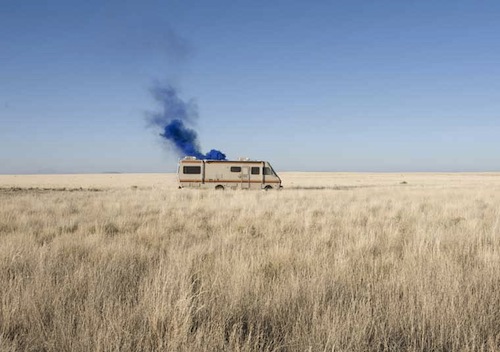
Treme
Not waiting long after the show’s debut on Sunday, HBO announced that it picked up a second season of Treme today.
Just as the inside of a flooded house is the ideal breeding ground for mold, post-Katrina New Orleans seems to be the ideal subject for a David Simon series.
On the one hand, Treme is a very different show than The Wire. Despite Wire fans wanting more, Treme isn’t centered around a police task force running a long investigation on one crime syndicate per season. Treme follows a disparate mix of musicians and citizens. But, it shares a definite thematic link with The Wire in the opportunity to tell stories that focus on institutions and how institutions can fail people.
If Deadwood told the story of a society coming together and developing institutions, and The Wire is the story of institutions having grown up and having their own inertia, Treme looks to be the story of rebuilding a society after it has been catastrophically failed by its institutions. It shows how civil society has broken down in some ways, developed its own norms in others, and continues in accordance with tradition in other ways.
Upon returning to the city in October 2005 (two months after Katrina, and one month before the first episode of Treme), Ernie The Attorney blogged, New Orleans – Returning home:
New Orleans will never be the same. And yet, at the same time, it will always be the same. Is that a contradiction? Probably, but then so is this city. If you lived here and you understood the city then you’ll know what I’m talking about. If you haven’t lived here and want to understand then come see what’s going on. It’s pretty amazing, but unfortunately I don’t even have an image to describe it. All I can say is that it’s worth being close to.
New Orleans is coming back to life. Have you ever witnessed the rebirth of a city? Creation of any kind is very hard to explain, especially when it happens to an entire community. So I won’t try. But if you are interested you should come here and see what’s going on. If you stand perfectly still and close your eyes you can feel the magic flowing in and saturating everything from the deepest soil to the tallest limbs.
Treme may be a more personal series than The Wire and focus on people as people rather than as members of their institutions, but this will be a show about society and how it rebuilds. And I expect David Simon, Eric Overmeyer and the producers, cast and crew of Treme to tell those stories well.
Links
HBO’s ‘Treme’ creator David Simon explains it all for you
Dave Walker, The Times-Picayune, HBO’s ‘Treme’ finally gets New Orleans right, “This is the screen depiction that New Orleans deserves, has always desired, but has been denied.”
Walker is also running a blog post after each episode to explain the local references and traditions to the rest of us, HBO’s ‘Treme’ explained: ‘Do You Know What it Means to Miss New Orleans?’
James Poniewozik, Time Magazine, HBO’s Treme: “New Orleans is not Baltimore, but it’s a great and troubled city whose flood pointed out the failings of government–heckuva job, Brownie–and the lingering racial imbalances in America.”
Alan Sepinwall, Treme, “Do You Know What It Means”: The ‘n’ is for ‘nuance’: “It helps that we start off with a somewhat more famous cast this time around. You see, for instance, John Goodman’s Creighton going all Walter Sobchek on the British camera crew and you have many of the fine points of that character.”
Ben Collins, MTV News ‘Treme’ Music Recap: Death, Resilience And Broken Hearts
See you in another life, brotha
Continuing the trend of Desmond-centric episodes being great, “Happily Ever After” brought a whole side of the family to dinner who we hadn’t seen much of this season.
Grab a glass of 60 year scotch and set sail to the spoilers coming up for “Happily Ever After” (Lost Season 6, Episode 11)
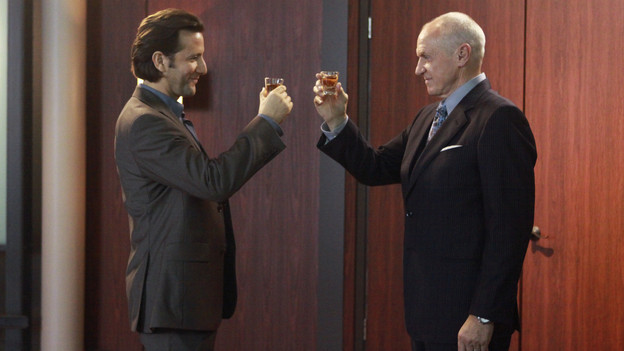
Search and Destroy
Lost, “Recon” (season 6 episode 8)
How much a particular episode of Lost is enjoyable depends more than anything else, on who is the featured character. If it’s a Locke episode or a Ben episode, it’s likely to be good. If it’s a Jack episode or a Kate episode, I would lower my expectations — but not expect all of their feature episodes to be subpar. Matthew Fox is very good when he’s working with Terry O’Quinn, but Jack is less likely to be effective paired with other characters. (However, the Richard-Jack scene in last week’s “Dr. Linus” was wonderful.) Actually, pretty much every actor on Lost gives a good performance when paired with O’Quinn. He tends to bring out the best in his fellow actors. So the fact that O’Quinn’s Smokey the Locke is at the center of this season is good.
Break out your copy of Raw Power and continue on to spoiler country after the break
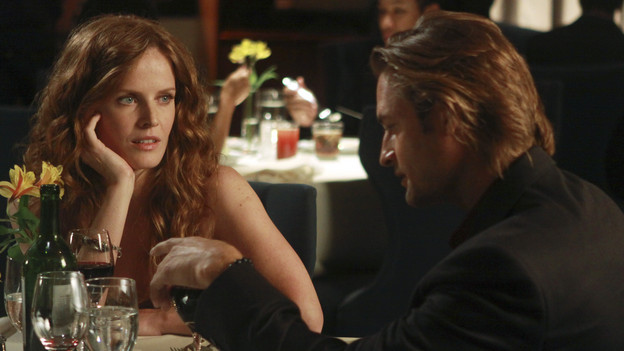
What do you call Russian Roulette played with dynamite?
or Able was I ere I saw Elba
Lost – “Dr. Linus”
(season 6, episode 7)
What would Lost be without Michael Emerson? The man has a talent to deliver any line with a creepy smarminess (See him in a 1992 prison guard training video), but also for conveying deep and genuine emotion. Benjamin Linus killed his father and let his adopted daughter be killed in service of Jacob and the Island. And what for? Why did he make those sacrifices?
More questions and spoilers after the break
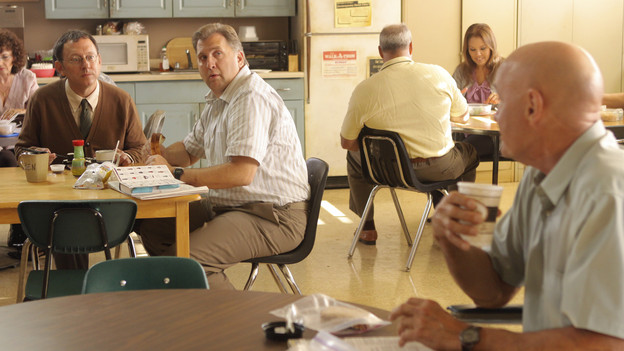
Monday TV
Chuck vs. the Beard
Chuck is a fundamentally silly show. Its version of international espionage involves many more “missions,” “secrets” and “being a spy” in 44 minutes than actual undercover operatives might use in their entire careers. But as the closest spiritual successor to Buffy the Vampire Slayer, it uses spy movie tropes to set the stage for stories that are allegorical. Buffy brought vampires, monsters and hellmouths to high school; Chuck brings James Bond to mid-20’s malaise.
Chuck’s second season paralleled stories in spy world with stories in Buy Moria, but the best episodes brought the two together. Just as Joyce Summer eventually learned about her daughter being the Slayer, this episode serves to further integrate Chuck’s spy life with his real life. While Chuck has become more of an ass as he’s used the Intersect 2.0 to become more of a spy (in particular, breaking up with Hannah), he’s fundamentally still a good person, who needs to talk about things with his friends and family. Unlike Sarah, Chuck has people close to him from whom he doesn’t want to keep big secrets (there’s that word again.)
One of the things that the show fixed from its first to second seasons was the character of Morgan. Josh Gomez dialed his performance down closer to human. Unfortunately, Morgan largely reverts to some of the overbearing nerd. Perhaps this was a conscious choice by first-time director Zachary Levi, or perhaps this was the character just freaking out when he learns that the Buy More is a cover for a joint CIA-NSA task force.
Although Office Space alumnus Diedrich Bader plays a twisted version of The Bobs and gives Chuck and Morgan a chance to have their biggest bromantic moment of the third season, it also plays against Jeffster performing CCR’s “Fortunate Son,” hand to hand combat and a Buy Moria take Iwo Jima.
How I Met Your Mother, “Of Course”
The second act of “Of Course” may have been this show’s single best act of the entire series. Realizing that breaking up Barney and Robin couldn’t just be a return to the status quo, HIMYM finally realized that the relationship did have an effect on the characters and that they couldn’t just go back to hanging out at McLaren’s together without consequences.
Fully integrated the heart and the funny. The emotional beats were cut properly with laughs, like Marshall’s song getting more involved each time we revisit it. And how can you not like an episode where Marshall punches the head off of a Stormtrooper and adds, “frankly, I’m still angry at the Empire”
Smoke in the temple, fire in the sky
109 episodes in, and only now am I going to start trying to write about individual episodes:
Lost, “Sundown” (season 6 episode 6)
“Sundown” certainly did not lack for action (or body count.) Sayid and Dogen fought in Dogen’s office, Smokey had some issues with the temple Others, Sayid settled some differences with Dogen and Lennon, while Ilana, Ben, Sun and Lapidus made it to the temple to save Miles from Smokey.
Spoilers continue after the break
